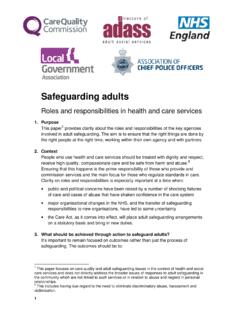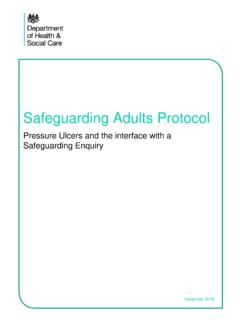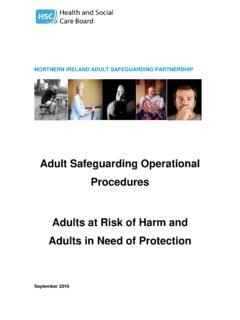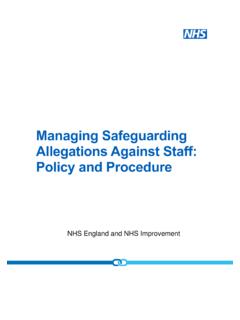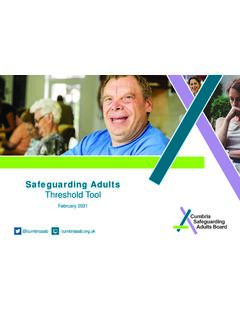Transcription of Safeguarding children and vulnerable adults - GOV.UK
1 Safeguarding children and vulnerable adultsThis document was archived on 31 March 2016archivedImportant factsThe police have an essential role in protecting children and vulnerable adults from abuse and are under a legal duty to carry out their functions having regard to (taking account of) the need to protect and promote the welfare of children . Section 11 of the children Act 2004 states that police authorities and the organisations which are taking on their roles (the Mayor s Office for Policing and Crime in London and police and crime commissioners) and the chief officer of each police force in England must make sure that they protect and promote the welfare of children . This means that, while officers from the child abuse investigation unit (CAIU) have a critical role to play in child Safeguarding , it is not just down to them it is a basic part of the duties of all police well as their duty to investigate criminal offences, the police have emergency powers to enter premises and make sure they can provide immediate protection for children believed to be suffering, or likely to suffer, significant information Protecting childrenThe police have a central role in protecting children , preventing and investigating crime.
2 Dedicated child-protection officers receive specialist training in investigating child-abuse cases, but all frontline officers have a crucial role to play in identifying and protecting children . The police hold important information about children who may be suffering, or likely to suffer, significant harm, as well as those who cause this harm, which they should share with other organisations if this is necessary to protect children . The police also have a duty to protect and promote the welfare of children in their care and in their custody at all stages of the process and make sure they keep to the requirements of the Police and Criminal Evidence (PACE) Act 1984. Working with partnersAt local level, the police are a partner in local Safeguarding children s boards (LSCBs). The membership of LSCBs is set out in the children Act 2004, and includes local authorities, health organisations, the police and others.
3 The aim of these boards is to co-ordinate member agencies in protecting and promoting the welfare of children and vulnerable adultsUnder section 47 of the children Act 1989, if there is a suspicion that a child is suffering, or is likely to suffer, significant harm, the local authority must make enquiries so they can decide whether they should take any action to protect and promote the welfare of the child. There should be a procedure in place, agreed between the local authority and the police, to guide both organisations in deciding how section-47 enquiries are carried out and, in particular, the circumstances in which joint enquiries are appropriate. Officers work with a number of partners in protecting children , for example, community safety partnerships, drug action teams, the Multi Agency Risk Assessment Conference (MARAC) and Multi Agency Public Protection Arrangements (MAPPA). Shared offices and models such as MASH (Multi-Agency Safeguarding Hub) are all designed to encourage partnership working and exchanging the information needed to protect children and the public.
4 Each police force operates a child sex offender disclosure scheme, which allows anyone to ask the police for checks to be made on a named individual who has contact with children . If an individual is found to have convictions for sexual offences against children , a risk-based disclosure will be made to the person who is best placed to protect the child. This will normally be the parent, carer, or guardian, rather than an automatic disclosure to the person who made the document was archived on 31 March 2016archivedChild sexual exploitationChild sexual exploitation is a form of abuse involving children and young people under the age of 18 where the young person is encouraged to perform sexual activities in exchange for something (for example, food, accommodation and money). It often involves using technology such as mobile phones or the internet and can take the form of organised crime.
5 The Government s Child Sexual Exploitation action plan, published last year, outlines a wide range of measures to tackle this form of abuse. It makes clear that this form of abuse can only be successfully identified where areas actively look for it, and that to correctly identify this issue, the police need to work closely with other plan includes action to deliver training for frontline police officers in recognising child sexual exploitation and to respond appropriately. This includes making sure that child sexual exploitation issues are included within wider investigation training on child abuse. What is the PCC s role in protection?PCCs have a legal responsibility to hold their chief officer to account for their duties in terms of protecting children . Specifically, section 1(8) (h) of the Police Reform and Social Responsibility Act 2011 states that: The police and crime commissioner must, in particular, hold the chief constable to account for the exercise of duties in relation to the Safeguarding of children and the promotion of child welfare that are imposed on the chief constable by sections 10 and 11 of the children Act 2004.
6 Offences committed against children can be particularly sensitive, and often mean the police need to work with other organisations, such as children s social care, when carrying out any investigation. The responsibilities laid out by section 11 of the children Act 2004 apply equally to children who may be victims of criminal offences and to children who are alleged to have committed criminal traffickingThe UK agreed and signed up to the Council of Europe Convention on Action against Trafficking in Human Beings on 17 December 2008, and the convention came into force in the United Kingdom on 1 April trafficking is a form of child abuse and the Government sees the trafficking of children as a very serious offence. If children are found to have been trafficked, police should make sure they are safe and that their welfare needs are urgently vulnerable adultsMost local authorities now run Safeguarding adults boards at which local partners, including the police, meet to discuss how they can work together to safeguard vulnerable adults from significant harm, including financial harm.
7 The Government have announced that they will legislate to make these boards statutory , which means that each area will have to operate one and the local police force will become a required partner on every board. This document was archived on 31 March 2016archiv











